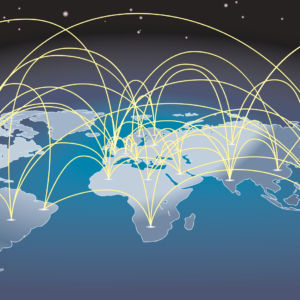After announcing steep tariffs on imported steel and aluminum on Thursday, President Trump tweeted the next morning, “When a country (USA) is losing many billions of dollars on trade with virtually every country it does business with, trade wars are good, and easy to win.”
The president could not be more wrong. Trade wars are bad for all countries involved, and the biggest losers will be American families and American workers in industries that depend on trade.
Trade wars happen when one nation raises tariffs on imports, and other nations retaliate with their own tariffs. The 25 percent steel tariff announced by Trump has already drawn threats from Canada, the European Union and other trading partners to target key U.S. exports. The result will be a decline in trade, both imports and exports, higher prices for domestic consumers and businesses, and job losses in key U.S. industries.
The most immediate casualties of a trade war will be American consumers. Higher domestic steel prices will lead to higher consumer prices for cars, appliances and new homes. The aluminum tariff will drive up the cost of beverage cans and other products Americans buy every day.
In other words, the president’s tariffs are a direct tax on the millions of low- and middle-income families he claims to champion.
Steel tariffs will inflict damage on a range of U.S. industries that use steel as a key component in their final products. In fact, for every worker at a steel plant in the United States, there are more than 40 workers employed in steel-consuming industries such as construction, motor vehicles and machinery. Steel tariffs imposed in 2002 by President George W. Bush caused the loss of 200,000 jobs in those industries, according to one study — more workers than were employed in the entire steel industry.
Another casualty in a pending trade war will be American exporters. If the United States can use “national security” as an excuse for steel and aluminum tariffs, other countries will find it much easier to make the same claim to protect their politically favored industries. Some may strike back directly with their own retaliatory tariffs. The most likely targets will be American exporters of agricultural and manufacturing products, putting more U.S. jobs in jeopardy.
U.S. steel executives were cheering the president’s move at the White House on Thursday, but even their industry will pay a price in the long run. Steel is becoming less and less important in our increasingly high-tech, service oriented economy. Since the 1970s, America’s annual per capita consumption of steel has dropped by almost half, from 1,400 pounds on average to 740 pounds. If Americans are forced to pay artificially higher prices for steel for years to come, it will only accelerate the underlying trend to find less costly substitutes. U.S. steel makers will find themselves fighting over a shrinking domestic market.
And finally a trade war over steel will weaken America as a nation and tarnish our role as a world leader. Most of our top steel suppliers are neighbors and allies — Canada, Brazil, South Korea, Mexico, Turkey, Japan and Germany. China is not even among the top 10. While the U.S. military consumes only 3 percent of our domestic steel production, the higher prices caused by the tariffs will make it more costly for the military to acquire new tanks and ships.
Secretary of Defense James Mattis, in a letter to Secretary of Commerce Wilbur Ross, endorsed the administration’s concerns over Chinese overproduction, but prudently warned, “(Defense Department) continues to be concerned about the negative impact on our key allies regarding the recommended options (i.e. tariffs) in the report.” Mattis requested more consultations and more targeted tariffs, but his request was ignored by Trump.
As trade wars go, this may not be on par with the protectionism of the 1930s that aggravated the Great Depression. While America’s nearly $20 trillion economy today may be able to shrug off any long-lasting effects of the coming trade spats, one thing is for sure: there will be far more losers than winners. And the biggest casualty will be U.S. families and workers.

